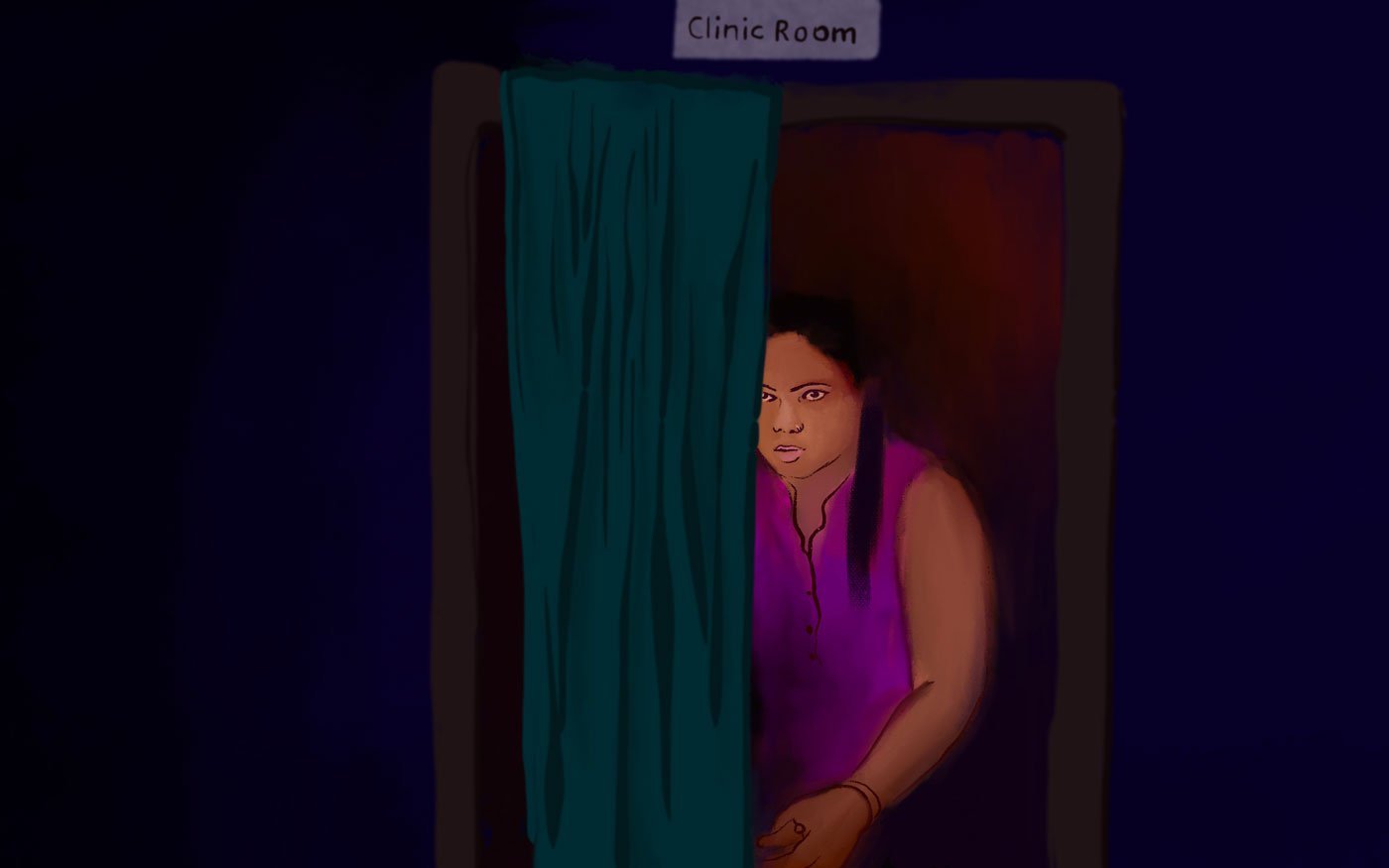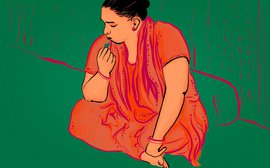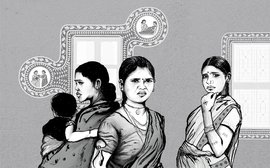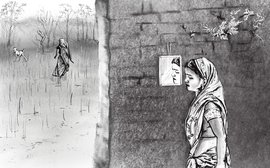“Just because we do sex work, they think our bodies should pay for anything.” Mira, 30, came to Delhi from Farrukhabad town in Uttar Pradesh in 2012, three children in tow, after her husband died of a sudden heart attack. She is now angry and exhausted in equal measure.
“ This is what they do when they give me my medicines.” Amita, 39, contorting her face in disgust at the memory, mimes the way male helpers and ward assistants in the hospital grope her, a palm lightly grazing the side of her body. She dreads the humiliation, but returns to the public hospital for check-ups or to get medicines.
“When we go for our HIV tests, if they get to know that we are sex workers, they will offer to help. ‘Peeche se aajaana, davai dilwa doonga [Come through the rear door, I’ll get the medicine for you],' they will claim. Then they will use the opportunity to touch us inappropriately.” As Kusum, 45, speaks, several nod in agreement with the former president of the All India Network of Sex Workers (AINSW), a federation of community organisations from 16 states, representing 4.5 lakh sex workers.
At a community shelter in the Rohini area of Delhi’s North West district, PARI meets a group of sex workers, mostly out of work due to the pandemic. Seated in a warm huddle on a winter afternoon, they are sharing a meal of home-cooked vegetables, dal and roti they have packed in steel tiffin boxes.
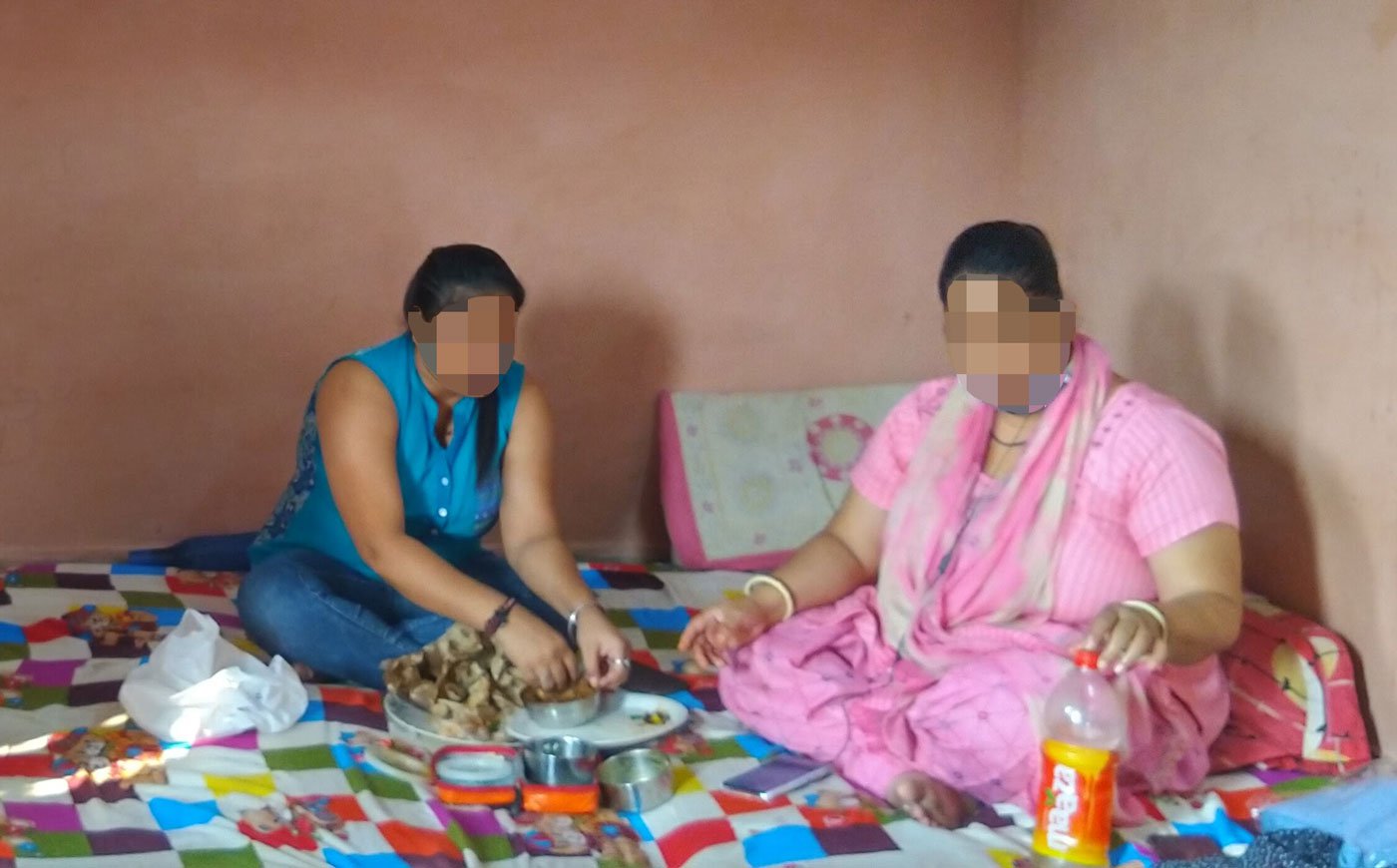
Sex workers sharing a meal at a community shelter in Delhi's North West district. Many have been out of work due to the pandemic
Accessing healthcare is tougher for single sex workers, says Mira.
“These men ask me to return to the hospital after 2 p.m. ‘I’ll get your work done,’ they say. It doesn’t happen for nothing. I have had to have sex with ward boys who I mistook for doctors, so that I could get medicines.” Sometimes we don’t have a choice, and have to compromise. We can’t always stand in a long line. We don’t have the luxury of time, especially if we have to meet a client, which will be at his convenience. We have to either seek treatment, or die hungry,” Mira continues, eyes flashing, her tone sarcastic. “And if I say anything or raise my voice, it brings me stigma that I am a sex worker. Then more doors will shut.”
The two government hospitals in the locality allot 60 minutes every day, from 12:30 p.m. to 1:30 p.m., for the medical needs of sex workers living nearby. This hour is reserved for them to get tested for HIV and other sexually transmitted infections (STI) – a facility extended by these two hospitals after receiving requests from NGO workers.
“Sex workers wouldn't queue up along with the general population because of the long lines and the time it took for them to get tested or treated,” says Rajni Tiwari, a volunteer with Savera, a non-profit organisation working with sex workers. If a client called while they were in the queue, she says, they would simply leave.
Squeezing in a visit to the doctor even during that one hour is sometimes difficult, says Tiwari. And this is only the start of their healthcare challenge.
Doctors only prescribe and provide medicines for STIs. The kits for testing HIV and syphilis are procured for the sex workers by NGOs like Savera with financial assistance from the Delhi State AIDS Control Society.
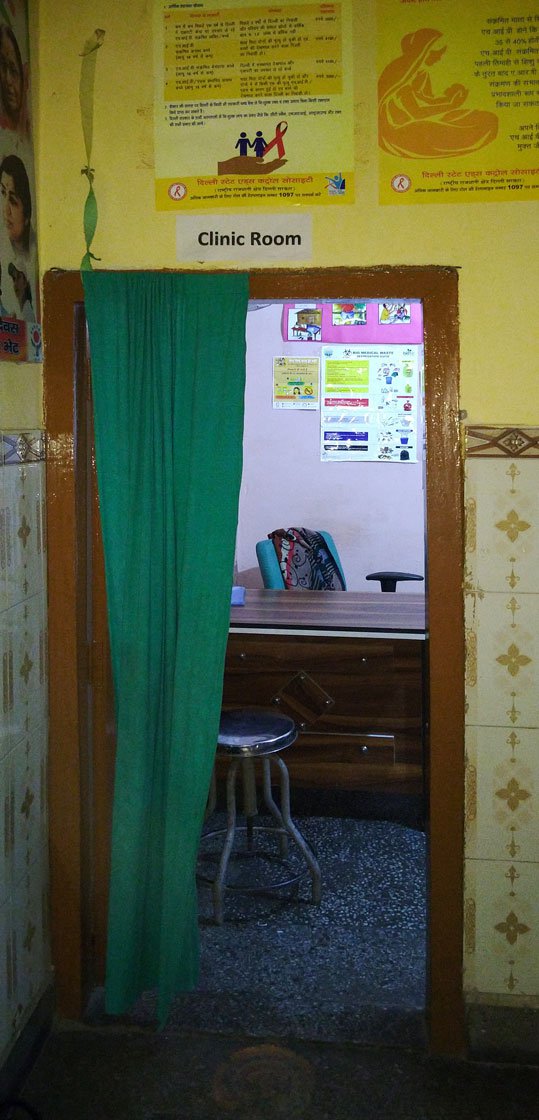
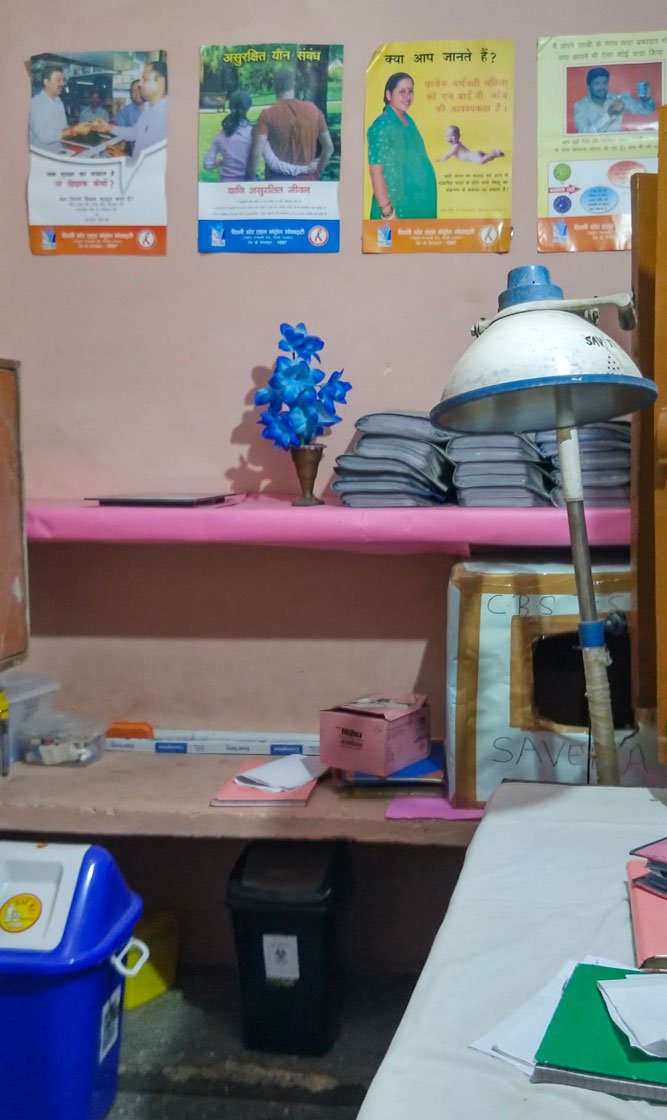
A room at the office of an NGO, where a visiting doctor gives sex workers medical advice and information about safe sex practices
“Sex workers are at risk for other ailments, such as fever, chest pain and diabetes, just like anyone else,” says Tiwari. “And it is not uncommon for the ward boys to exploit them if they find out they are sex workers,” she adds, confirming what the sex workers recounted.
For male staffers, identifying sex workers from among the women patients can be easy.
The community shelter where the women meet is a short distance from the hospital. Before the pandemic, Amita’s clients would pick her up from the hospital gate, under the gaze of some male staff.
“The guards also understand that people with the slip of paper for HIV testing are sex workers. Later, when we go for testing, they recognise us and tell one another. At times, we may need a client to help us see the doctor without having to stand in a queue,” says Amita. In fact, there are separate queues for consultation, treatment and medicine.
Amita moved to Delhi from Patna two decades ago with two sons and a daughter after her husband deserted them. It was when she was denied payments after being hired as a daily wage labourer at a factory that a friend introduced her to sex work. “I cried for days that I didn’t want to do this work, but 600 rupees a day in 2007 was a big deal – I could eat for 10 days.”
It is easy to see from the narratives of Amita, Mira and the others that sex workers experience a unique stigma that limits their ability to access healthcare. A 2014 report says this causes them to not reveal their occupation at hospitals. “Female sex workers are humiliated and criticised, made to wait for inordinately long periods of time, not examined properly, forced to undergo HIV tests, overcharged for services at private hospitals, denied medical services, delivery care; and their confidentiality violated,” says the report compiled by advocacy groups and sex workers’ collectives under the National Network of Sex Workers.
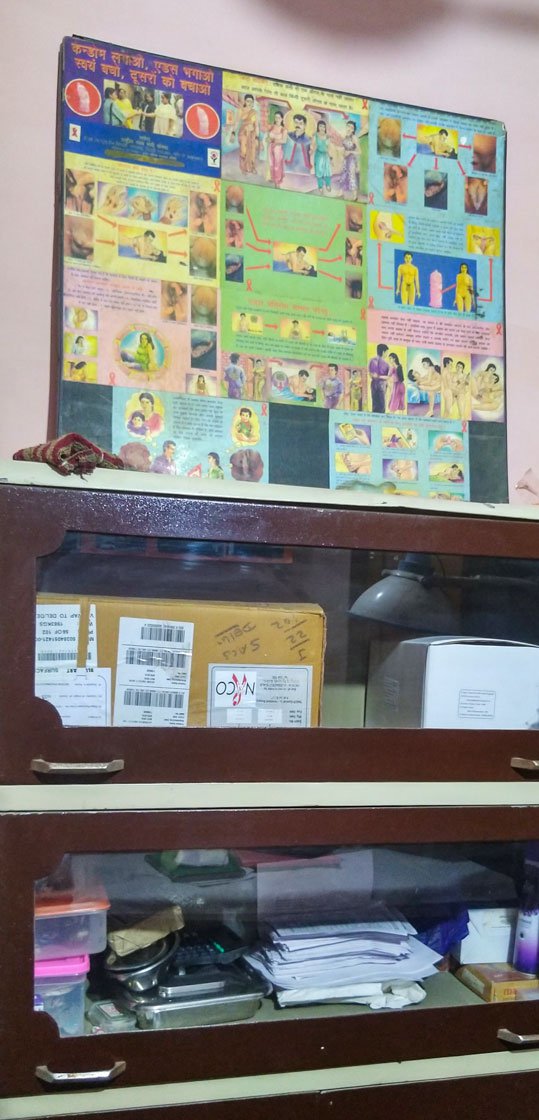
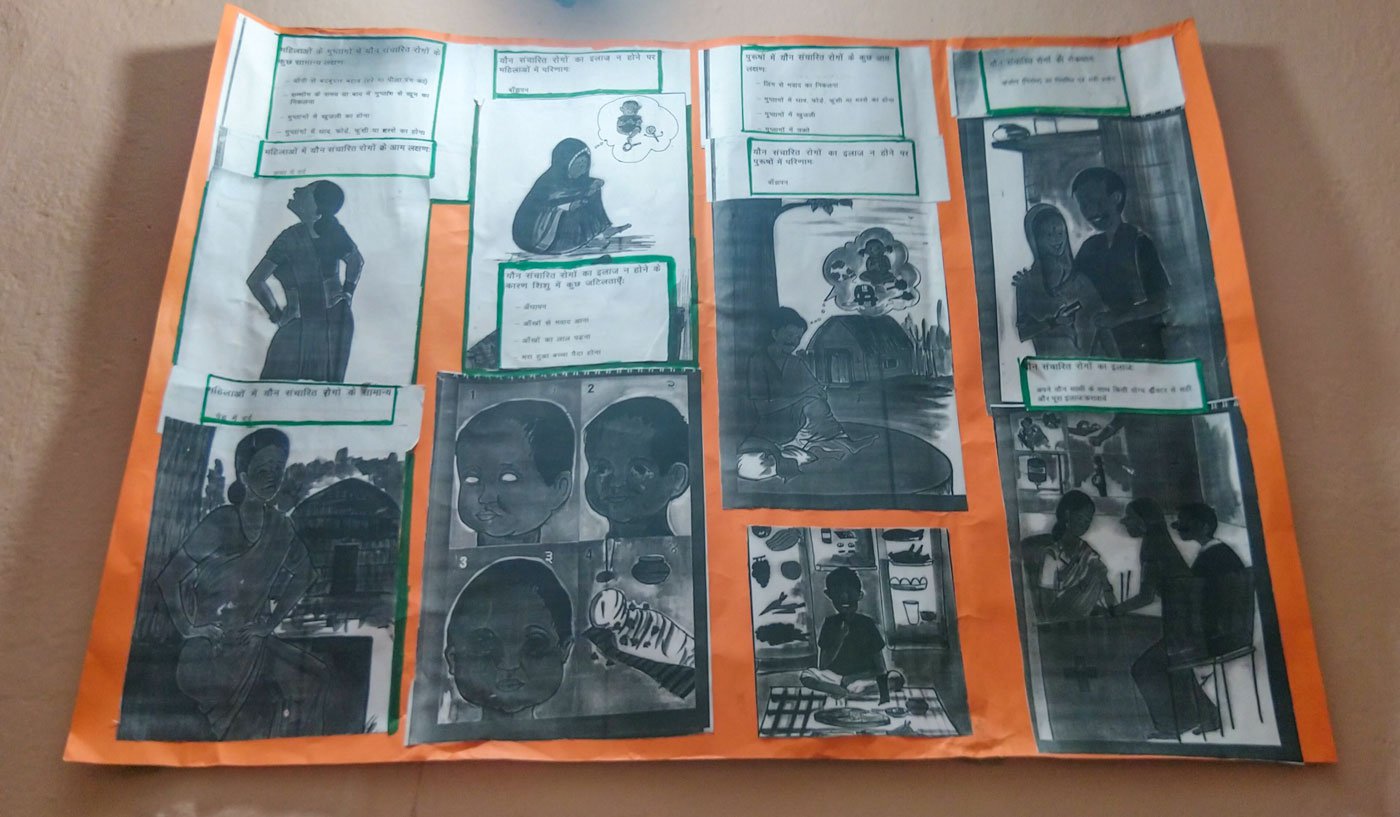
Left: An informative chart for sex workers. Right: At the community shelter, an illustrated handmade poster of their experiences
Amita’s experiences mirror the report’s findings. “Only for big diseases like HIV or for abortions, or if we are tired of treating something locally, do we go to a big hospital. At other times we go to a jhola chaap doctor [unlicensed medical practitioners]. If they get to know we do dhandha [sex work], they too try to extract favours,” she says.
Almost nobody they encounter extends them any dignity, Kusum adds. As soon as their profession is revealed, the exploitation follows. If not sex, they want momentary gratification, or the perverse pleasure of humiliating them. “ Bas kisi tarah body touch karna hai unko [They just want to touch our bodies].”
As a result, sex workers have to be coaxed to seek medical help, says Suman Kumar Biswas, a Rohini-based doctor who sees sex workers at the office of a non-profit organisation. He distributes condoms and gives the women medical advice.
The Covid-19 pandemic sharpened biases against sex workers, rendering them more vulnerable to exploitation.
“Sex workers have been treated like untouchables,” says Putul Singh, the current president of AINSW. “We were removed from ration lines or badgered for Aadhaar cards ... One of our sisters had a complicated pregnancy, but the ambulance refused to come unless we paid more than 5,000 rupees for a few kilometres. We somehow got her to the hospital, but the staff refused to treat her, making vague excuses. One doctor agreed to see her, but stood at a distance from the patient.” Singh says the woman eventually lost the child, though they took her to a private clinic.
*****
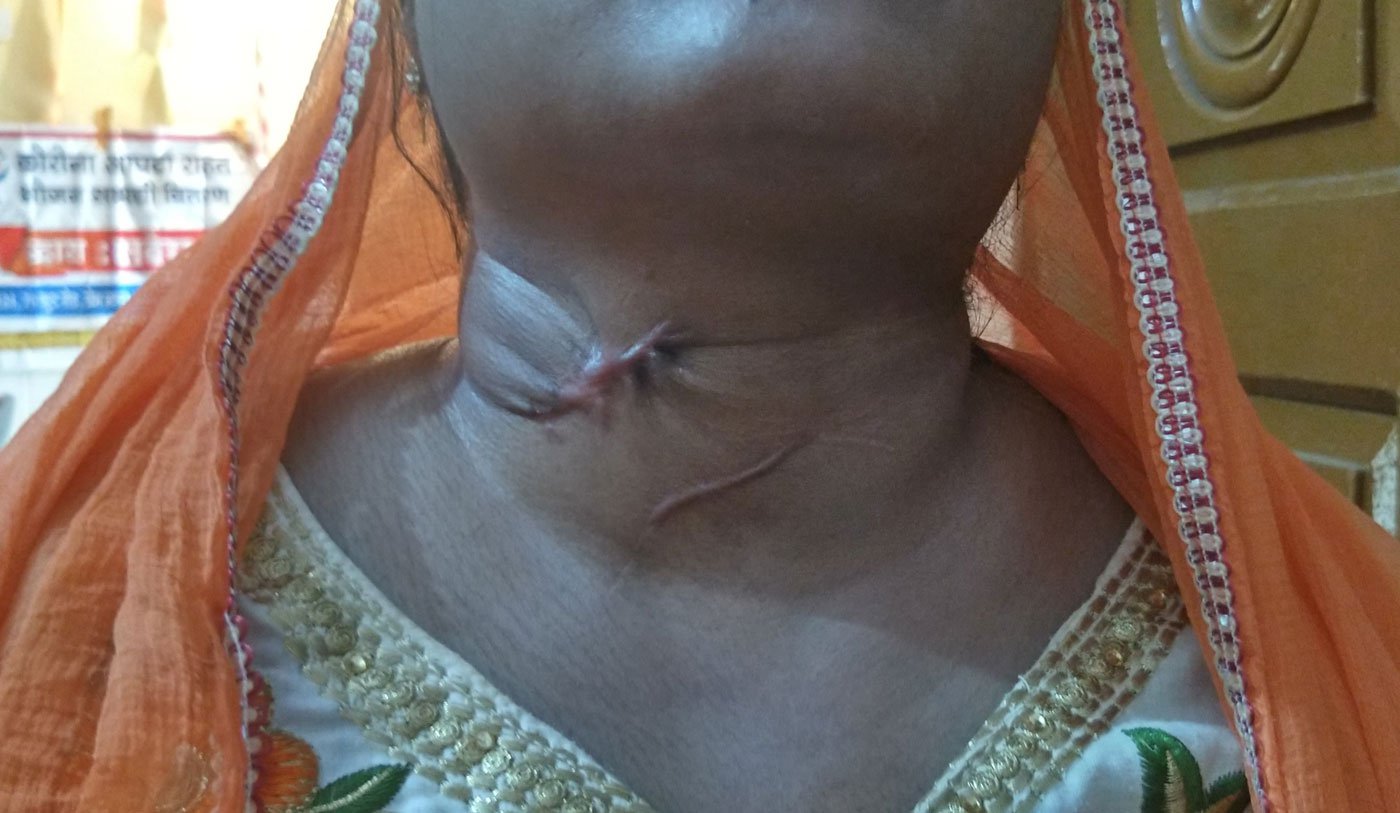
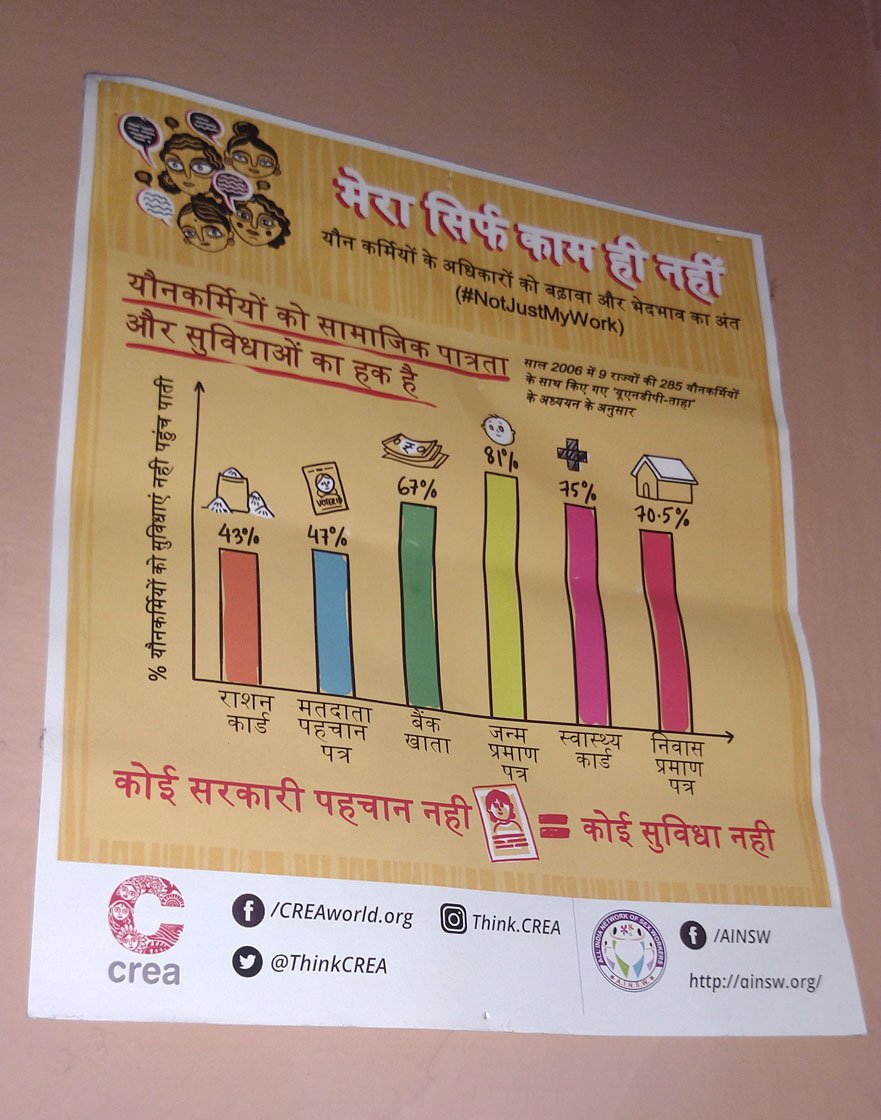
Left: Pinki was left with a scar after a client-turned-lover tried to slit her throat. She didn't seek medical attention for fear of bringing on a police case. Right: A poster demanding social schemes and government identification documents for sex workers
Private versus public healthcare, the women say, is a complex choice. “In a private hospital, we consult a doctor without having to give our izzat [dignity],” says Amita. But these clinics can be prohibitively expensive. For instance, an abortion costs three times more, or at least Rs. 15,000, in a private clinic.
The other problem with government hospitals is the emphasis on paperwork.
Pinki, 28, unmasks her face and neck to show an unsightly scar where a client-turned-lover tried to slit her throat, in jealousy. “A million questions would be asked, identities revealed, a possible police case slapped on us. Plus when most of us leave our homes in the village we don’t always have or carry ration cards or such documents,” she says, explaining why she didn’t go to a government hospital.
The Indian Women’s Health Charter of March 2007 said sex workers are seen as a “public health threat”. Over a decade later, little has changed, even in the country's capital city. And the pandemic has pushed sex workers further to the edge.
In October 2020, the National Human Rights Commission issued an advisory on the rights of women in the context of Covid-19. It said sex workers’ vulnerability had increased exponentially – their livelihood had been hit, those who were HIV-positive were unable to access anti-retroviral therapy, and many were not covered by government welfare schemes for want of identity documents. Eventually, however, the NHRC revised its statement on sex workers, dropping a key suggestion to recognise them as informal workers, which would have entitled them to the benefits and welfare measures rolled out for workers. It suggested instead that sex workers be provided relief on humanitarian grounds.
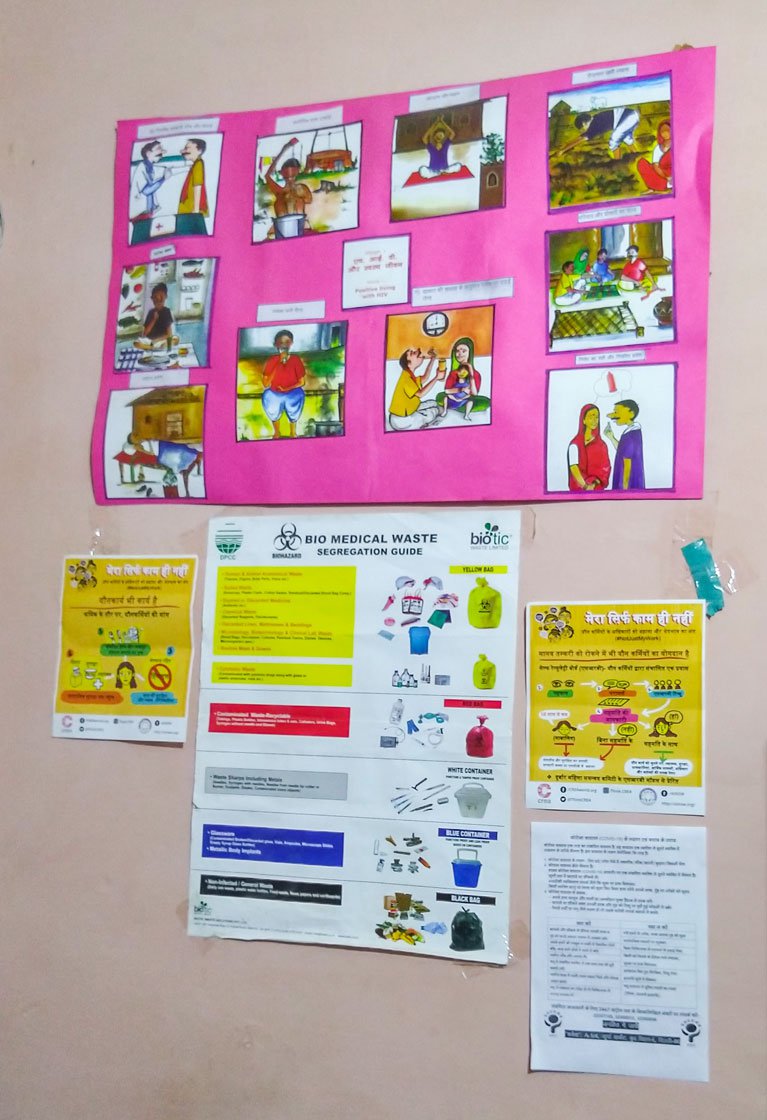
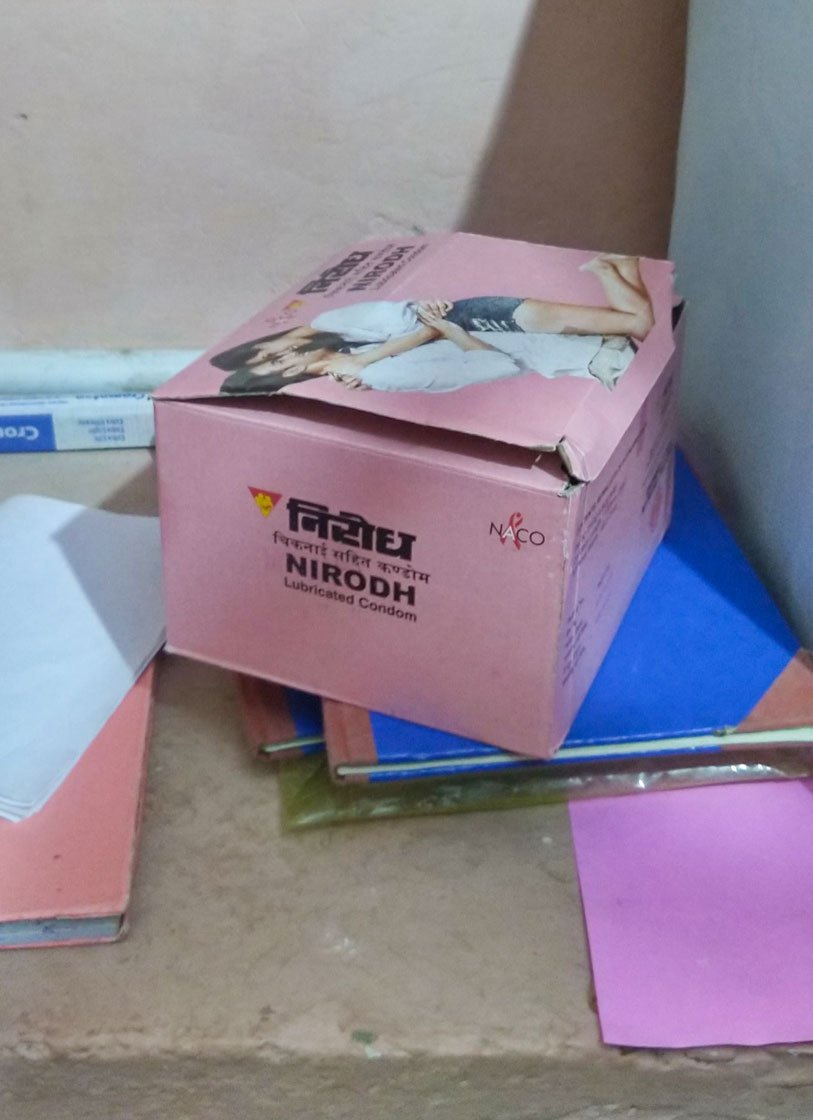
At the NGO office, posters and charts provide information to the women. Condoms are also distributed there
“It was worse during Covid, when government hospitals told sex workers ‘we won’t touch you because you may spread the virus’. So they were denied medicines and tests,” says Sneha Mukherjee, an advocate with the Delhi-based Human Rights Law Network. The draft Trafficking in Persons Bill, 2021 views all sex workers as victims of trafficking and, once enacted into law, would make conditions to operate as a sex worker more difficult, according to Mukherjee. This could further alienate healthcare for sex workers, she cautions.
Prior to 2020, with one or two clients a day paying between Rs. 200-400, a sex worker could earn Rs. 6,000-8,000 a month. Since the first nationwide Covid-19 lockdown (March 2020), with no clients for months, sex workers, like most informal workers, had to rely on charity. With even the bare minimum food being rationed, medicines were out of the question.
“Even the rations stopped in March 2021. The government didn’t launch any scheme to help sex workers,” says Amit Kumar, coordinator, AINSW. “Nearly two years into the pandemic, they are still struggling to find clients. Apart from a lack of food, they are suffering from mental health issues, with livelihoods lost and their families finding out what they do.”
The 2014 report by the sex workers’ network said there were over 800,000 sex workers in India. According to Tiwari, roughly 30,000 live in Delhi. About 30 NGOs in the capital work with them for regular testing, each with a target of 1,000 or more sex workers. The women see themselves as daily wage earners. “We call it sex work, not prostitution. I earn daily and eat daily. I have a fixed spot. I can take one client a day or two, each pays 200 to 300 rupees,” says Rani, 34, a widow from Budaun district in UP.
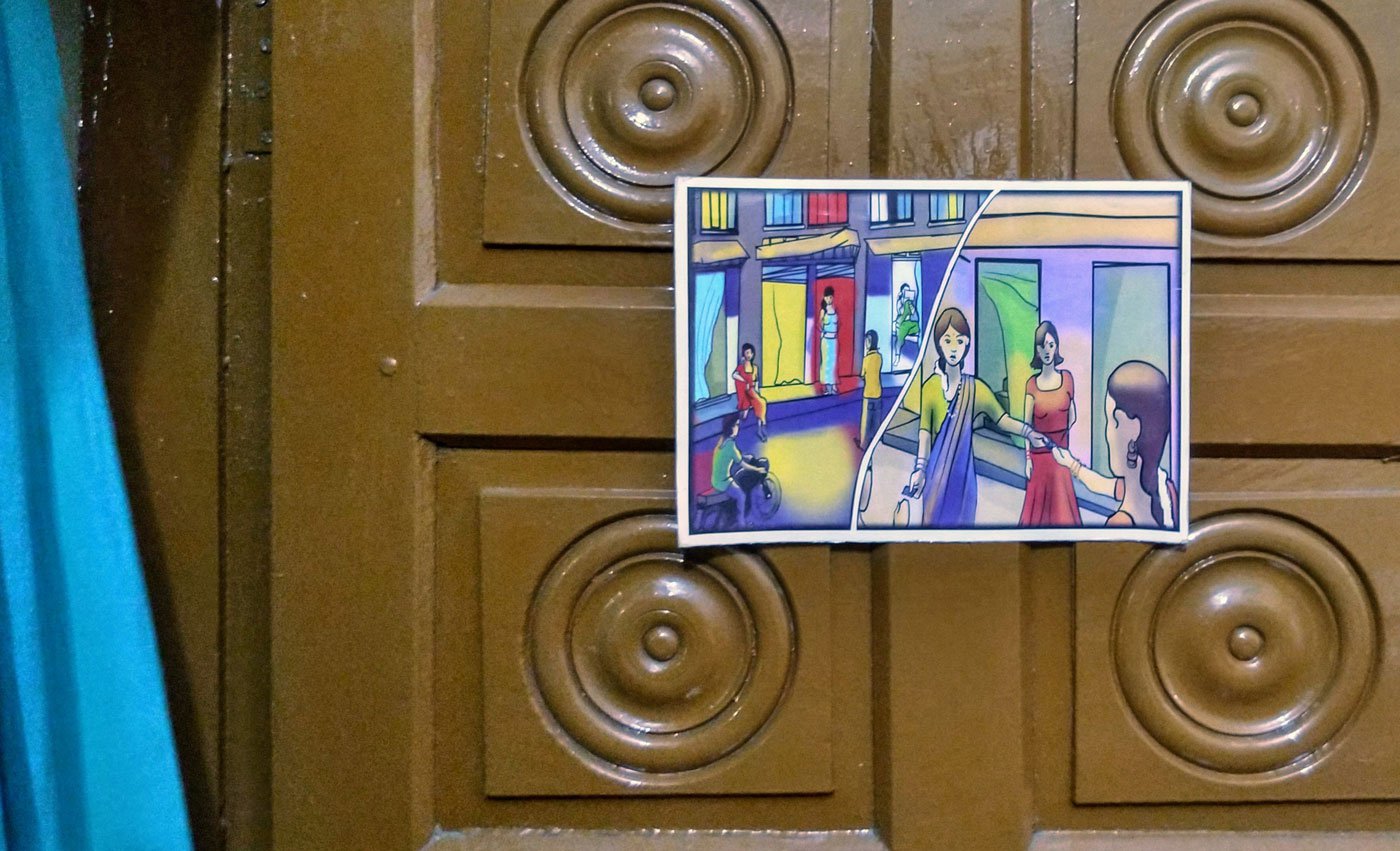
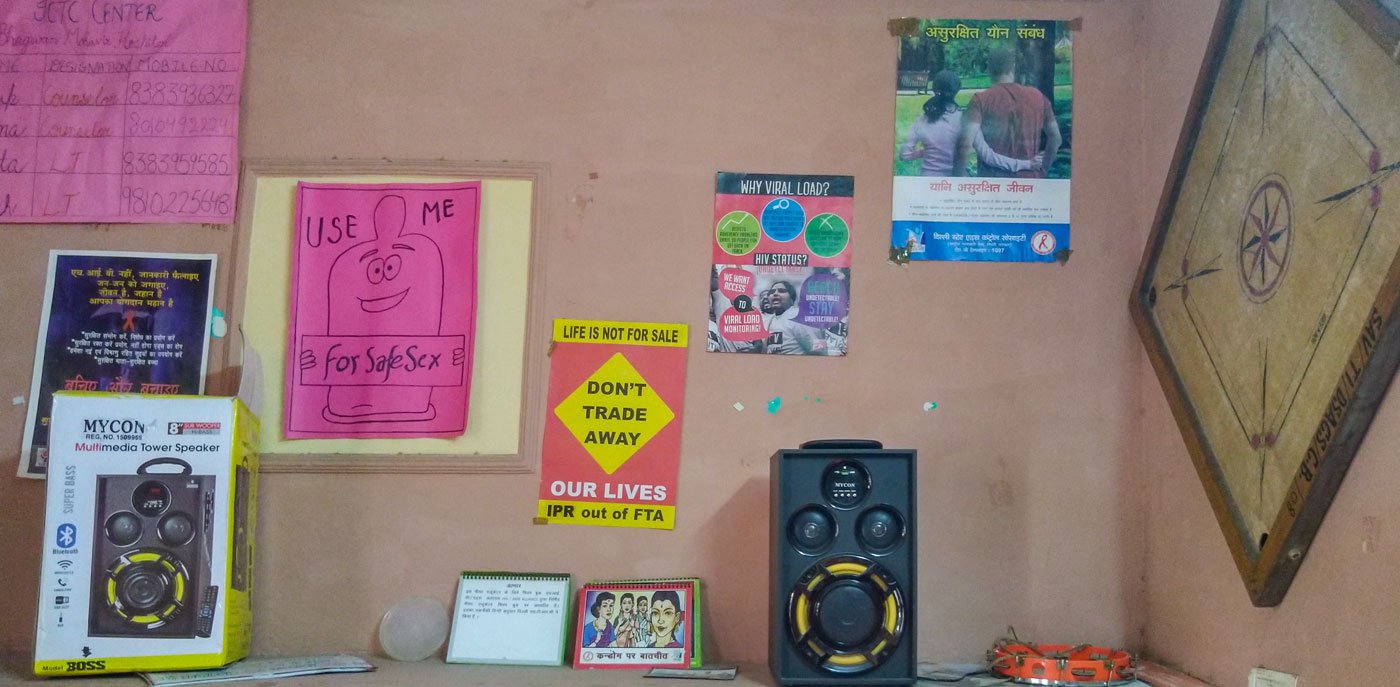
There are nearly 30,000 sex workers in Delhi, and about 30 not-for-profit organisations provide them with information and support
The means of income is but one part of their identity. “It’s important to remember that sex workers are also single women, single mothers, Dalit women, non-literate women, migrant women and so on, with other identities that have determined their life trajectories,” says Manjima Bhattacharjya, a Mumbai-based activist and feminist theorist. She is the author of Intimate City , a book that looks at how globalisation and technology have affected sexual commerce. “In many cases, women do multiple kinds of informal work to make ends meet: domestic work at one time, sex work at another, and construction work or factory work,” she says.
Sex work comes with its own precarities. “If we use someone’s home for work, that person also takes a commission. If the client is mine, I give 200 to 300 rupees rent per month. But if it is didi’s [the home-owner’s] client, I have to pay her a fixed sum,” says Rani.
She takes me to one such apartment where the owner, after confirming that we won’t jeopardise their arrangement by revealing her identity, shows us the allotted room. It is sparsely furnished with a bed, a mirror, photos of Indian gods, and an old cooler for the summer. Two young women sit on the bed, busy on their mobiles. Two men smoking in the balcony avert their eyes.
The question of choice in the ‘world’s oldest profession’ – using the body as an economic resource – has been historically complicated to answer. It is hard to assert choice when the choice is not perceived to be a good or moral one, offers Bhattacharjya. “Which woman would like to be known as someone who wants to do sex work? A parallel might be how girls find it hard to explicitly say they consented to sex with a boyfriend or partner as it positions them as ‘bad’ girls.”
Meanwhile, Rani wonders what to tell her growing children about what their mother does to pay for their food, shelter, school fees and their medicines.
Names of the sex workers have been changed in the story to protect privacy.
PARI and CounterMedia Trust's nationwide reporting project on adolescent girls and young women in rural India is part of a Population Foundation of India-supported initiative to explore the situation of these vital yet marginalised groups, through the voices and lived experience of ordinary people.
Want to republish this article? Please write to [email protected] with a cc to [email protected] .
